中职英语基础模块unit
- 格式:ppt
- 大小:2.46 MB
- 文档页数:45
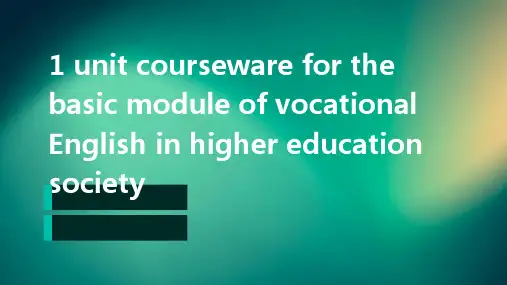
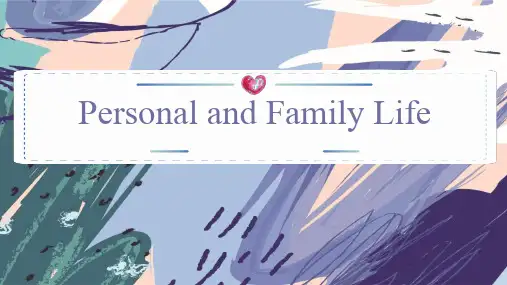
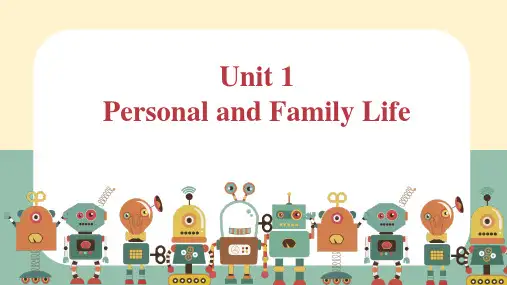
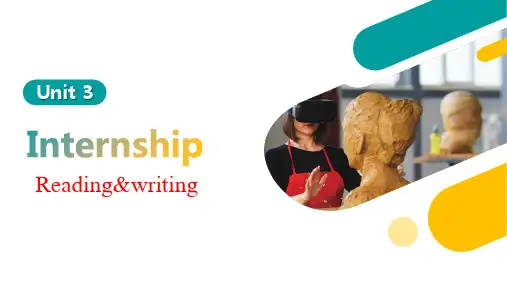
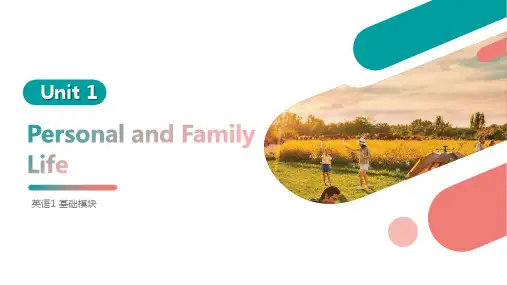

中职英语基础模块一unit7Unit 7 of the basic module in vocational school English covers a variety of topics that are essential for students to learn and understand. This unit focuses on different aspects of work, including job interviews, employment, and workplace communication. It is important for students to grasp these concepts in order to prepare them for thefuture workforce. This unit also helps students develop their English language skills in the context of the workplace, which is crucial for their future careers.One of the key topics covered in this unit is job interviews. Job interviews can be a nerve-wracking experience for many people, especially for students who are just starting to enter the workforce. This unit provides valuable information on how to prepare for a job interview, including tips on how to dress, how to answer common interview questions, and how to make a good impression. This knowledge can help students feel more confident and prepared when they eventually go on job interviews.Another important aspect of this unit is learning about employment rights and responsibilities. Students need to understand their rights as employees, as well as their responsibilities in the workplace. This includes knowing about minimum wage laws, workplace safety regulations, and anti-discrimination laws. Understanding these concepts is essential for students to protect themselves and advocate for their rights in the workplace.Additionally, this unit also covers workplace communication, which is a crucial skill for any job. Effective communication is essential for building strong relationships with coworkers, supervisors, and clients. This unit provides students with the opportunity topractice their communication skills through role-playing activities and discussions. By learning how to communicate effectively in the workplace, students can improve their chances of success in their future careers.Furthermore, this unit emphasizes the importance of professionalism in the workplace. Students learn about theimportance of being punctual, reliable, and respectful in a professional setting. They also learn about thesignificance of maintaining a positive attitude and working well with others. These lessons are crucial for students to develop a strong work ethic and professional demeanor, which are essential for success in any job.In conclusion, Unit 7 of the basic module in vocational school English covers a wide range of important topics related to work and employment. By learning about job interviews, employment rights and responsibilities, workplace communication, and professionalism, students can develop the skills and knowledge they need to succeed in the workforce. This unit provides valuable information and practical experience that can help students prepare for their future careers. Overall, this unit is an essential part of vocational school education and plays a crucialrole in shaping students into successful and competent professionals.。
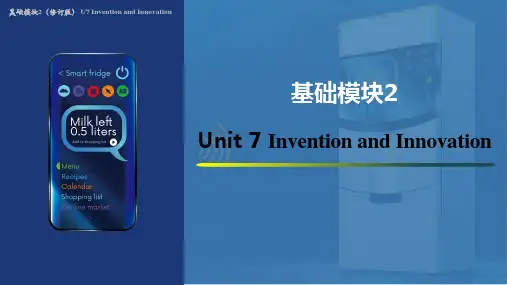
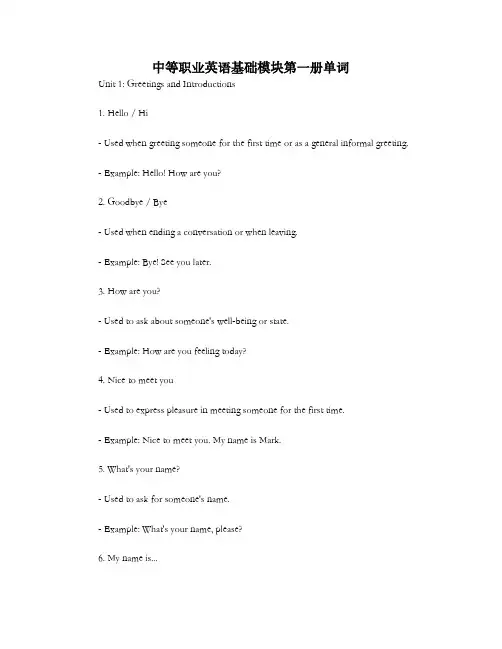
中等职业英语基础模块第一册单词Unit 1: Greetings and Introductions1. Hello / Hi- Used when greeting someone for the first time or as a general informal greeting. - Example: Hello! How are you?2. Goodbye / Bye- Used when ending a conversation or when leaving.- Example: Bye! See you later.3. How are you?- Used to ask about someone's well-being or state.- Example: How are you feeling today?4. Nice to meet you- Used to express pleasure in meeting someone for the first time.- Example: Nice to meet you. My name is Mark.5. What's your name?- Used to ask for someone's name.- Example: What's your name, please?6. My name is...- Used to introduce oneself and provide the name.- Example: My name is Emily. Nice to meet you.7. Where are you from?- Used to ask about someone's place of origin.- Example: Where are you from originally?8. I'm from...- Used to state one's place of origin.- Example: I'm from France. What about you?9. How old are you?- Used to ask about someone's age.- Example: May I ask how old you are?10. I'm... years old.- Used to state one's age.- Example: I'm 25 years old. How about you?Unit 2: Numbers1. Zero- The numerical symbol representing the value of nothing or no quantity. - Example: There are zero seats available.- The numerical symbol representing the value of a single unit or entity. - Example: I have one sister.3. Two- The numerical symbol representing the value of two units or entities. - Example: I need two cups of coffee.4. Three- The numerical symbol representing the value of three units or entities. - Example: I have three cats.5. Four- The numerical symbol representing the value of four units or entities. - Example: There are four chairs in the room.6. Five- The numerical symbol representing the value of five units or entities. - Example: I have five fingers on each hand.7. Six- The numerical symbol representing the value of six units or entities. - Example: She has six books on her shelf.- The numerical symbol representing the value of seven units or entities. - Example: We'll meet at seven o'clock.9. Eight- The numerical symbol representing the value of eight units or entities. - Example: I'll be there in eight minutes.10. Nine- The numerical symbol representing the value of nine units or entities. - Example: There are nine planets in our solar system.Unit 3: Colors1. Red- The color associated with passion, love, and intensity.- Example: She was wearing a stunning red dress.2. Blue- The color associated with calmness, serenity, and stability.- Example: The sky is a beautiful shade of blue today.3. Yellow- The color associated with happiness, joy, and energy.- Example: The sunflowers are bright yellow.4. Green- The color associated with nature, growth, and freshness.- Example: The leaves on the trees are a vibrant green.5. Orange- The color associated with enthusiasm, creativity, and warmth. - Example: He painted the walls in a lovely shade of orange. 6. Purple- The color associated with royalty, luxury, and power.- Example: The queen wore a regal purple gown.7. Pink- The color associated with femininity, sweetness, and kindness. - Example: The baby girl's room is painted in soft pink.8. Brown- The color associated with earthiness, stability, and reliability. - Example: His eyes are a warm shade of brown.9. Black- The color associated with formality, elegance, and mystery.- Example: She wore a black evening gown to the party.10. White- The color associated with purity, innocence, and cleanliness.- Example: The bride wore a white wedding dress.This document provides a comprehensive list of basic words related to the Middle Vocational English Module 1. The topics covered include greetings and introductions, numbers, and colors. Each unit contains ten words, along with brief explanations and examples. These words will help you build a solid foundation in the English language.。
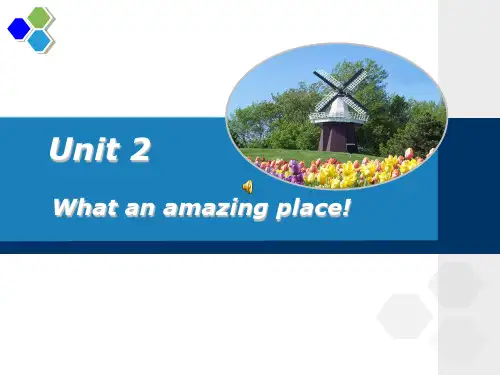
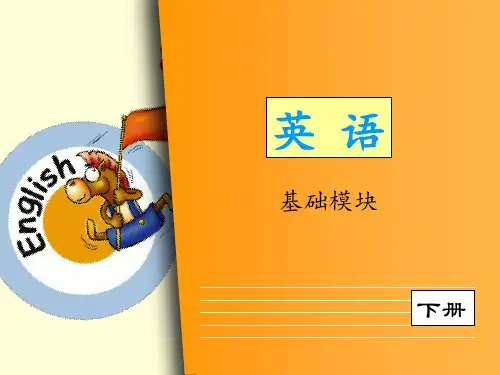
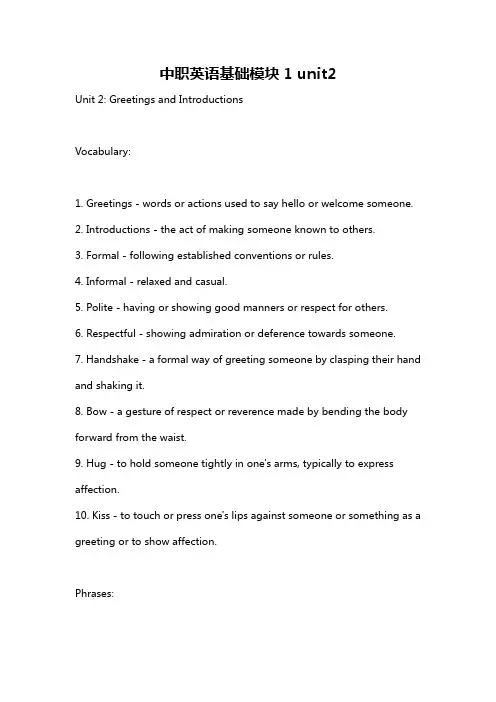
中职英语基础模块1 unit2Unit 2: Greetings and IntroductionsVocabulary:1. Greetings - words or actions used to say hello or welcome someone.2. Introductions - the act of making someone known to others.3. Formal - following established conventions or rules.4. Informal - relaxed and casual.5. Polite - having or showing good manners or respect for others.6. Respectful - showing admiration or deference towards someone.7. Handshake - a formal way of greeting someone by clasping their hand and shaking it.8. Bow - a gesture of respect or reverence made by bending the body forward from the waist.9. Hug - to hold someone tightly in one's arms, typically to express affection.10. Kiss - to touch or press one's lips against someone or something as a greeting or to show affection.Phrases:1. How are you? - a common greeting used to ask about someone's well-being.2. Nice to meet you - a polite phrase used to express pleasure in meeting someone for the first time.3. What's your name? - a question used to ask someone's name.4. My name is... - a phrase used to introduce oneself by stating their name.5. Where are you from? - a question used to ask someone's place of origin.6. I'm from... - a phrase used to state one's place of origin.7. How old are you? - a question used to ask someone's age.8. I'm... years old - a phrase used to state one's age.9. Goodbye - a common farewell used to say goodbye to someone.10. See you later - a casual phrase used to say goodbye with the intention of seeing the person again.Sentences:1. Hello, how are you?2. Nice to meet you, my name is John.3. Where are you from?4. I'm from China.5. How old are you?6. I'm 18 years old.7. Goodbye, have a nice day!8. See you later, take care!Dialogues:Dialogue 1:A: Hello, how are you?B: I'm good, thank you. How about you?A: I'm great, thanks for asking. Nice to meet you, my name is Lisa. B: Nice to meet you too, Lisa. I'm Mike.Dialogue 2:A: Where are you from, Mike?B: I'm from the United States. How about you, Lisa?A: I'm from China.B: That's interesting. How old are you?A: I'm 20 years old. And you?B: I'm 22. Goodbye, it was nice talking to you.A: Goodbye, see you later!Note: The above dialogues are just examples and can be modified or expanded upon based on the context and individuals involved.。
中职英语基础模块上册Unit 1: GreetingsIn this unit, you will learn how to greet people in different situations, such as meeting new people, meeting your friends, and meeting your teacher. You will also learn how to introduce yourself and others. Practice the phrases and sentences regularly to improve your spoken English.Unit 2: FamilyThis unit is about family members and relationships. You will learn the names of family members, such as parents, siblings, and grandparents. You will also learn how to describe their personalities and physical appearances. Through this unit, you will be able to talk about your own family in English.Unit 3: School LifeIn this unit, you will learn school-related vocabulary and phrases. You will learn the names of school subjects, school facilities, and school activities. You will also learn how to talk about daily routines and school events. The goal is to enable you to communicate about your school life confidently.Unit 4: HobbiesThis unit focuses on discussing hobbies and interests in English. You will learn how to express your likes and dislikes, as well as talk about your hobbies. You will also learn how to ask others about their hobbies and interests. By the end of this unit, you should be able to have conversations about hobbies with others.Unit 5: Daily RoutinesIn this unit, you will learn how to talk about your daily routines and activities. You will learn the vocabulary for daily activities, such as waking up, bathing, eating meals,and going to bed. By mastering the content of this unit, you will be able to describe your typical day to others.Unit 6: Plans and SchedulesThis unit will teach you how to discuss future plans and schedules in English. You will learn vocabulary related to making plans, scheduling events, and discussing future activities. You will also learn how to use time-related expressions to talk about future events. After completing this unit, you should be able to make plans with others and talk about your future schedule confidently.Overall, the Basic Module of Junior Vocational English covers essential topics for daily communication. It aims to equip learners with the necessary language skills to communicate effectively in various social and work-related situations. Regular practice and review of the content is crucial for mastering the material.。
Unit 1单元知识清单重点单词1.Delivery person外卖员2.Firefighter消防员3.Flight attendant空乘服务员4.Cook v.烹饪n.厨师5.Notice注意6.Parent父亲或母亲7.Parents父亲和母亲8.Photo照片(复数加s)9.Younger sister 妹妹10.O ld sister 姐姐11.F amous著名的12.(in)formal正式的13.A ddressing称呼14.A ncestors祖先15.M ajority大部分16.F ew少量17.S ubject学科主题18.C ompany公司19.E arth地球20.R ecommend推荐21.F orget忘记22.L ate达到23.A rrive到达24.A rrive抵达25.L azy懒惰26.M aybe也许重点短语1.For in stance=for example 例如2.It is said据说3.Primary school小学e from来自5.Keep in mind记住6.Pay attention to注意到7.High-speed rail高铁cating the young教书(育人)9.Save food节约粮食10.Save water节约用水11.By the way ,... 顺便说12.welcome to...欢迎到……来13.be glad to do很高兴做14.look at看……15.have a look at看一下16.classroom building教学楼17.a lot of =lots of=many许多(修饰可数名词复数)18.much(修饰不可数名词)19.reading room阅览室20.after class课后21.in class 课堂上22.next to靠近;紧挨着23.thank for 为……而感谢……24.thank sb.for sth. 为某事感谢某人25.thanks to...多亏,由于26.let sb. do sth.让某人做某事27.Here we are!我们到了!28.How large it is!多么大呀!29.See you next time!下次见30.on one’s way to 在某人去某地的路上31.in this way 用这种方法重点句型1.I am very glad to meet you here today.我很高兴今天能在这儿见到你。